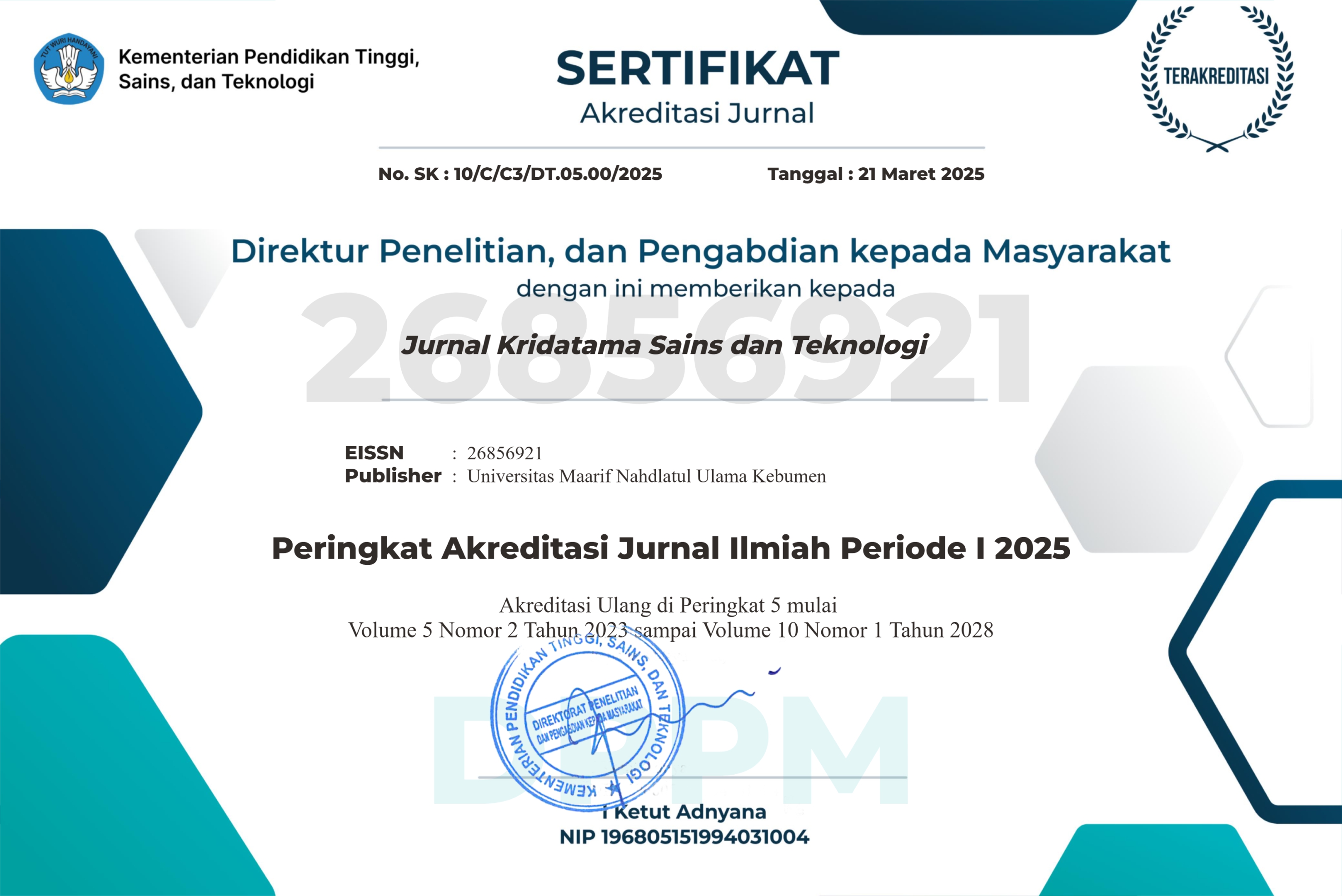Manajemen Budaya Pondok Pesantren Roudlotut Tholibin Sirau Kemranjen Banyumas dalam Mengembangkan Kecerdasan Santri
DOI:
https://doi.org/10.53863/kst.v4i02.588Abstract
Islamic boarding schools as the oldest Islamic educational institutions which are considered traditional and which are considered closed to innovation. However, they must be ready to face the challenges of the times and are required to develop the potential of students with the power of knowledge and technology through cultural management at Islamic boarding schools to increase the intelligence of students at Roudlotut Tholibin Sirau Islamic Boarding School, Kemranjen, Banyumas. This study uses a qualitative descriptive method with data collection techniques through documentation, observation, interviews. From this study, the results were obtained that in an effort to improve the three intelligences (intellectual, emotional, and spiritual) which are carried out continuously and consistently through formal education in Islamic boarding schools with good management with a benchmark of success, namely alumni continuing their studies at tertiary institutions both in country or abroad.
Keywords: education management, Islamic boarding schools, intelligence
References
Agustian, Ary Ginanjar. (2001), Rahasia Sukses Membangun Kecerdasan Emosi dan Spiritual ESQ Emotional Spiritual Quotient, Jakarta: Arga.
Arikunto, N. (1989), Prosedur Penelitian; Suatu Pendekatan Praktek, Jakarta; Bina Aksara.
Arikunto, Suharsimi. (2002), Prosedur Penelitian Suatu Pendekatan Praktek, Jakarta: Rineka Cipta.
Mardalis. (2004), Metode Penelitian Suatu Pendekatan Proposal, Jakarta: PT.Bumi Aksara.
Margono, S. (2004), Metodologi Penelitian Pendidikan, Jakarta: PT Rineka Cipta.
Miftahul Luthfi, Muhammad, (2004). Quantum Believing, Surabaya: Duta Ikhwana Salama Ma’had TeeBee.
Moeleong, Lexy J. (1997). Metode Penelitian Kualitatif, Bandung: Remaja Rosda Karya.
Muhadjir, Noeng. (2000), Metodologi Penelitian Kualitatif, Yogyakarta: Rake Sarasin.
Partanto, Pius A dan Al Barry Dahlan. (1994), Kamus Ilmiah Populer, Surabaya: Arkola).
Purwanto, Ngalim. (2001). Administrasi dan Supervisi Pendidikan, Bandung: PT. Remaja Rosdakarya.
Sahlan, Asmaun. (2010), Mewujudkan Budaya Religius di Sekolah, Malang: UIN-MALIKI PRESS (Anggota IKAPI)
Salovey, P., dan Mayer, J.D. (1990). Emotional intelligence, imagination. Cognition and Personality
Sugiyono. (2010). Metode Penelitian Pendidikan Pendekatan Kuantitatif, Kualitatif, dan R&D, Bandung: Alfabeta.
Suparyogo, Imam (2001), Metodologi Penelitian Sosial-Agama, Bandung: PT. Remaja Rosdakarya.
Sujdana. Nana. (1998). Tuntunan Penyusunan Karya Ilmiah, Bandung: Sinar Baru.
Suprapto. (2013), “Pengembangan Ekstrakurikuler PAI: Studi Kasus SMAN I Mataram, NTB” , Edukasi, Volume 11, Nomor 2, Mei-Agustus, 2013
Sutawi (2009), “Keberhasilan Jepang Mengelola Kecerdasan Intelektual (IQ), Kecerdasan Emosional (EQ), dan Kecerdasan Spiritual (SQ)”, Jurnal Pendidikan dan Kebudayaan, Vol. 15. No. 6.
Riyanto, Yatim. (2007), Metodologi Penelitian Pendidikan Kualitatif Dan Kuantitatif , Surabaya: Unesa University Press.
Tim Penyusun Kamus Pusat Pembinaan dan Pengembangan Bahasa (1988), Kamus Besar Bahasa Indonesia, Jakarta: Balai Pustaka.
Wahyudi. (2009). Kepemimpinan Kepala Sekolah Dalam Organisasi Pembelajar, Bandung: Alfabeta.
Wigglesworth, C. (2012). The 21 Skills of Spiritual Intelligence, New York: Select Books, p.7
Downloads
Published
How to Cite
Issue
Section
License
Copyright (c) 2022 Ayi Najmul Hidayat,Mujiburrahman Mujiburrahman,Fauzi Al Muhtad

This work is licensed under a Creative Commons Attribution-NonCommercial-NoDerivatives 4.0 International License.
Authors retain copyright and grant the journal right of first publication with the work simultaneously licensed under a Creative Commons Attribution-ShareAlike 4.0 International License that allows others to share the work with an acknowledgment of the work’s authorship and initial publication in this journal

















